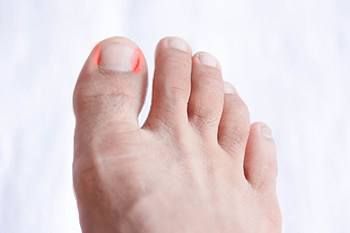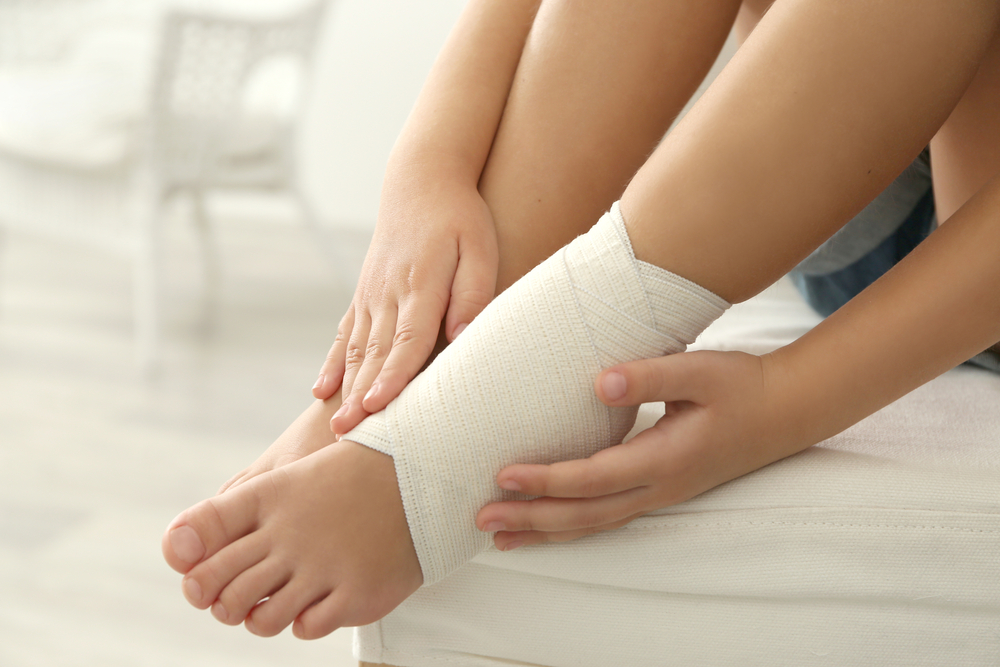Items filtered by date: November 2021
What Is an Ingrown Toenail?
 When the toenail curls downwards and into the skin surrounding the nail, it is referred to as an ingrown toenail. Common signs of an ingrown toenail include pain, redness, and swelling. Ingrown toenails can become infected if they are not treated. Ingrown toenails can form from a variety of reasons, such as shoes that are too tight, not properly trimming the toenails, excessively sweaty feet, or trauma to the toe. Patients who are struggling with an ingrown toenail may be able to find relief by soaking their feet in warm water for around 15 minutes a few times a day. However, ingrown toenails that persist should be looked at by a podiatrist in order to prevent an infection.
When the toenail curls downwards and into the skin surrounding the nail, it is referred to as an ingrown toenail. Common signs of an ingrown toenail include pain, redness, and swelling. Ingrown toenails can become infected if they are not treated. Ingrown toenails can form from a variety of reasons, such as shoes that are too tight, not properly trimming the toenails, excessively sweaty feet, or trauma to the toe. Patients who are struggling with an ingrown toenail may be able to find relief by soaking their feet in warm water for around 15 minutes a few times a day. However, ingrown toenails that persist should be looked at by a podiatrist in order to prevent an infection.
Ingrown toenails may initially present themselves as a minor discomfort, but they may progress into an infection in the skin without proper treatment. For more information about ingrown toenails, contact one of our podiatrists of Pennsylvania. Our doctors can provide the care you need to keep you pain-free and on your feet.
Ingrown Toenails
Ingrown toenails are caused when the corner or side of a toenail grows into the soft flesh surrounding it. They often result in redness, swelling, pain, and in some cases, infection. This condition typically affects the big toe and may recur if it is not treated properly.
Causes
- Improper toenail trimming
- Genetics
- Improper shoe fitting
- Injury from pedicures or nail picking
- Abnormal gait
- Poor hygiene
You are more likely to develop an ingrown toenail if you are obese, have diabetes, arthritis, or have any fungal infection in your nails. Additionally, people who have foot or toe deformities are at a higher risk of developing an ingrown toenail.
Symptoms
Some symptoms of ingrown toenails are redness, swelling, and pain. In rare cases, there may be a yellowish drainage coming from the nail.
Treatment
Ignoring an ingrown toenail can have serious complications. Infections of the nail border can progress to a deeper soft-tissue infection, which can then turn into a bone infection. You should always speak with your podiatrist if you suspect you have an ingrown toenail, especially if you have diabetes or poor circulation.
If you have any questions, please feel free to contact one of our offices located in Plymouth Meeting and Ambler, PA . We offer the newest diagnostic and treatment technologies for all your foot care needs.
Gout Pain Can Be Managed
What Is Extensor Tendonitis?
 The extensor tendons are fibrous bands of tissue that run along the top of the foot, allowing you to move your toes. When these tendons are injured, usually due to repetitive strain from overuse, wearing tight shoes, or sudden training changes, they become inflamed. This causes aching pain in the top of the foot that worsens during exercise and while stretching the toes, as well as swelling over the top of the foot. Symptoms tend to develop gradually and progressively worsen. Treatments for extensor tendonitis are typically conservative and may involve resting and icing the foot, taking over-the-counter pain medications, and wearing comfortable, supportive shoes. If you are suffering from foot pain, please seek the care of a podiatrist.
The extensor tendons are fibrous bands of tissue that run along the top of the foot, allowing you to move your toes. When these tendons are injured, usually due to repetitive strain from overuse, wearing tight shoes, or sudden training changes, they become inflamed. This causes aching pain in the top of the foot that worsens during exercise and while stretching the toes, as well as swelling over the top of the foot. Symptoms tend to develop gradually and progressively worsen. Treatments for extensor tendonitis are typically conservative and may involve resting and icing the foot, taking over-the-counter pain medications, and wearing comfortable, supportive shoes. If you are suffering from foot pain, please seek the care of a podiatrist.
Ankle and foot injuries are common among athletes and in many sports. They can be caused by several problems and may be potentially serious. If you are feeling pain or think you were injured in a sporting event or when exercising, consult with one of our podiatrists from Pennsylvania. Our doctors will assess your condition and provide you with quality foot and ankle treatment.
Common Injuries
The most common injuries that occur in sporting activities include:
- Achilles Tendonitis
- Achilles Tendon Rupture
- Ankle Sprains
- Broken Foot
- Plantar Fasciitis
- Stress Fractures
- Turf Toe
Symptoms
Symptoms vary depending upon the injury and in some cases, there may be no symptoms at all. However, in most cases, some form of symptom is experienced. Pain, aching, burning, bruising, tenderness, tightness or stiffness, sensation loss, difficulty moving, and swelling are the most common symptoms.
Treatment
Just as symptoms vary depending upon the injury, so do treatment options. A common treatment method is known as the RICE method. This method involves rest, applying ice, compression and elevating the afflicted foot or ankle. If the injury appears to be more serious, surgery might be required, such as arthroscopic or reconstructive surgery. Lastly, rehabilitation or therapy might be needed to gain full functionality in the afflicted area. Any discomfort experienced by an athlete must be evaluated by a licensed, reputable medical professional.
If you have any questions, please feel free to contact one of our offices located in Plymouth Meeting and Ambler, PA . We offer the newest diagnostic and treatment technologies for all your foot care needs.
How Do I Keep My Toddler From Falling?
When it comes to falling and the many foot and ankle injuries associated with it, the elderly are not the only group at risk. Young children fall frequently as they learn to walk, climb, run, and explore the world around them. While you may not be able to prevent every fall, you can take steps to prevent any major injuries. Around the home, lock doors that lead to dangerous areas and use sliding gates on stairways. Ensure that all carpets and rugs are held securely in place to prevent tripping or slipping. Keep hallways, stairs, and walking areas around the house free of clutter. Keep an eye on your child while they play and don’t allow them to climb high furniture. For more information about preventing falls for your loved ones of all ages, please consult with a podiatrist.
Preventing falls among the elderly is very important. If you are older and have fallen or fear that you are prone to falling, consult with one of our podiatrists from Pennsylvania. Our doctors will assess your condition and provide you with quality advice and care.
Every 11 seconds, an elderly American is being treated in an emergency room for a fall related injury. Falls are the leading cause of head and hip injuries for those 65 and older. Due to decreases in strength, balance, senses, and lack of awareness, elderly persons are very susceptible to falling. Thankfully, there are a number of things older persons can do to prevent falls.
How to Prevent Falls
Some effective methods that older persons can do to prevent falls include:
- Enrolling in strength and balance exercise program to increase balance and strength
- Periodically having your sight and hearing checked
- Discuss any medications you have with a doctor to see if it increases the risk of falling
- Clearing the house of falling hazards and installing devices like grab bars and railings
- Utilizing a walker or cane
- Wearing shoes that provide good support and cushioning
- Talking to family members about falling and increasing awareness
Falling can be a traumatic and embarrassing experience for elderly persons; this can make them less willing to leave the house, and less willing to talk to someone about their fears of falling. Doing such things, however, will increase the likelihood of tripping or losing one’s balance. Knowing the causes of falling and how to prevent them is the best way to mitigate the risk of serious injury.
If you have any questions, please feel free to contact one of our offices located in Plymouth Meeting and Ambler, PA . We offer the newest diagnostic and treatment technologies for all your foot care needs.
Why Do I Have Plantar Fasciitis?
Plantar fasciitis, the inflammation of the ligament that runs along the bottom of the foot and connects the toes to the heel bone, is a common cause of heel pain. When the plantar fascia is injured through repetitive strain, excessive exercise, prolonged standing, wearing uncomfortable shoes, or obesity, it may lead to stabbing heel pain that is typically at its worst when taking the first few steps after a long rest. Other possible causes of plantar fasciitis include structural abnormalities in the foot, such as having flat feet, high arches, overpronation, or leg length differences. Foot changes associated with aging or pregnancy may also be to blame in some cases. If you are suffering from heel pain, don’t hesitate to schedule an appointment with a podiatrist near you.
Plantar fasciitis is a common foot condition that is often caused by a strain injury. If you are experiencing heel pain or symptoms of plantar fasciitis, contact one of our podiatrists from Pennsylvania. Our doctors can provide the care you need to keep you pain-free and on your feet.
What Is Plantar Fasciitis?
Plantar fasciitis is one of the most common causes of heel pain. The plantar fascia is a ligament that connects your heel to the front of your foot. When this ligament becomes inflamed, plantar fasciitis is the result. If you have plantar fasciitis you will have a stabbing pain that usually occurs with your first steps in the morning. As the day progresses and you walk around more, this pain will start to disappear, but it will return after long periods of standing or sitting.
What Causes Plantar Fasciitis?
- Excessive running
- Having high arches in your feet
- Other foot issues such as flat feet
- Pregnancy (due to the sudden weight gain)
- Being on your feet very often
There are some risk factors that may make you more likely to develop plantar fasciitis compared to others. The condition most commonly affects adults between the ages of 40 and 60. It also tends to affect people who are obese because the extra pounds result in extra stress being placed on the plantar fascia.
Prevention
- Take good care of your feet – Wear shoes that have good arch support and heel cushioning.
- Maintain a healthy weight
- If you are a runner, alternate running with other sports that won’t cause heel pain
There are a variety of treatment options available for plantar fasciitis along with the pain that accompanies it. Additionally, physical therapy is a very important component in the treatment process. It is important that you meet with your podiatrist to determine which treatment option is best for you.
If you have any questions, please feel free to contact one of our offices located in Plymouth Meeting and Ambler, PA . We offer the newest diagnostic and treatment technologies for all your foot care needs.



